Unit 6 Food and lifestyle Grammar 课件(共27张PPT)
文档属性
| 名称 | Unit 6 Food and lifestyle Grammar 课件(共27张PPT) | 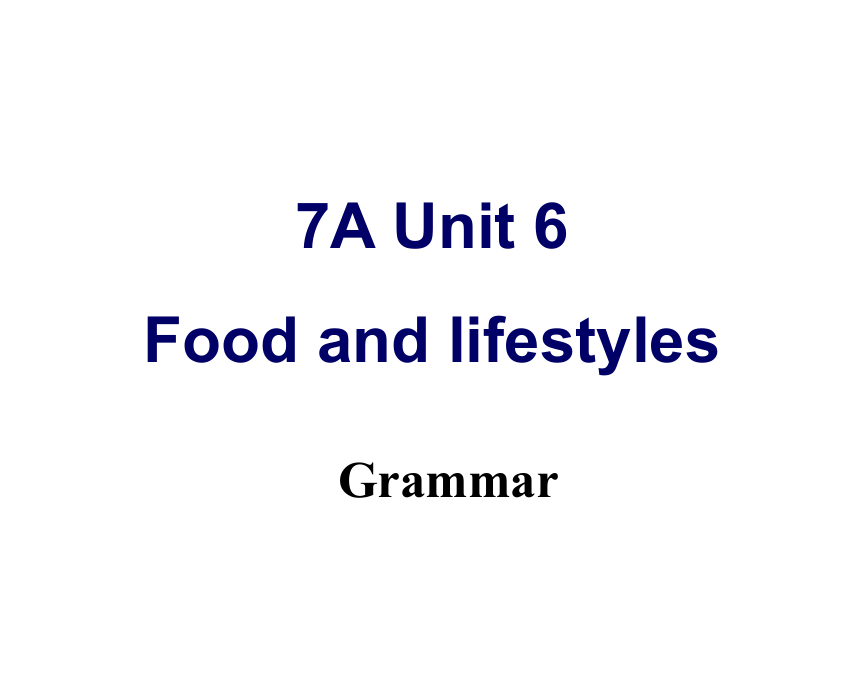 | |
| 格式 | zip | ||
| 文件大小 | 769.5KB | ||
| 资源类型 | 教案 | ||
| 版本资源 | 牛津译林版 | ||
| 科目 | 英语 | ||
| 更新时间 | 2019-07-07 19:46:49 | ||
图片预览

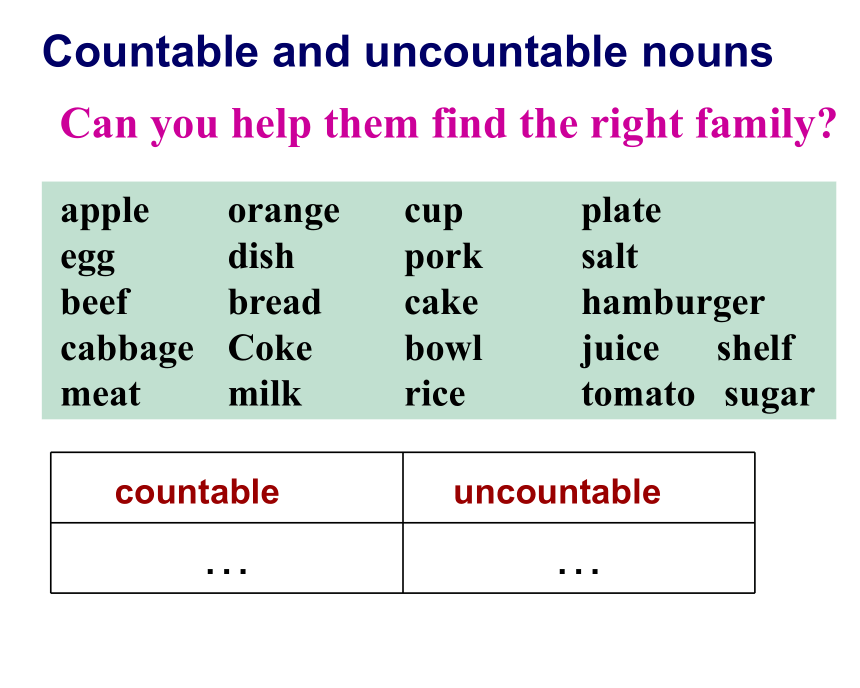
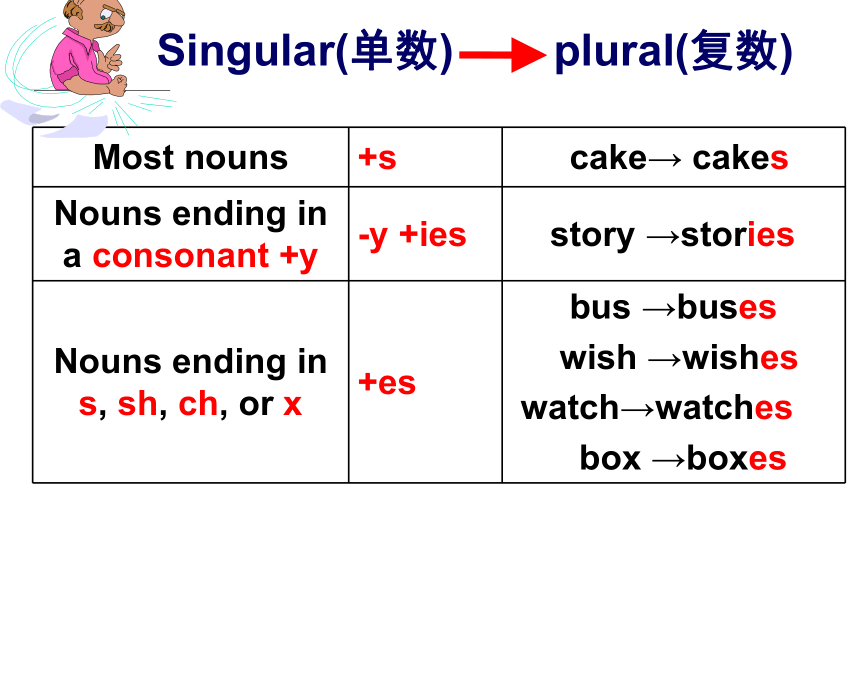

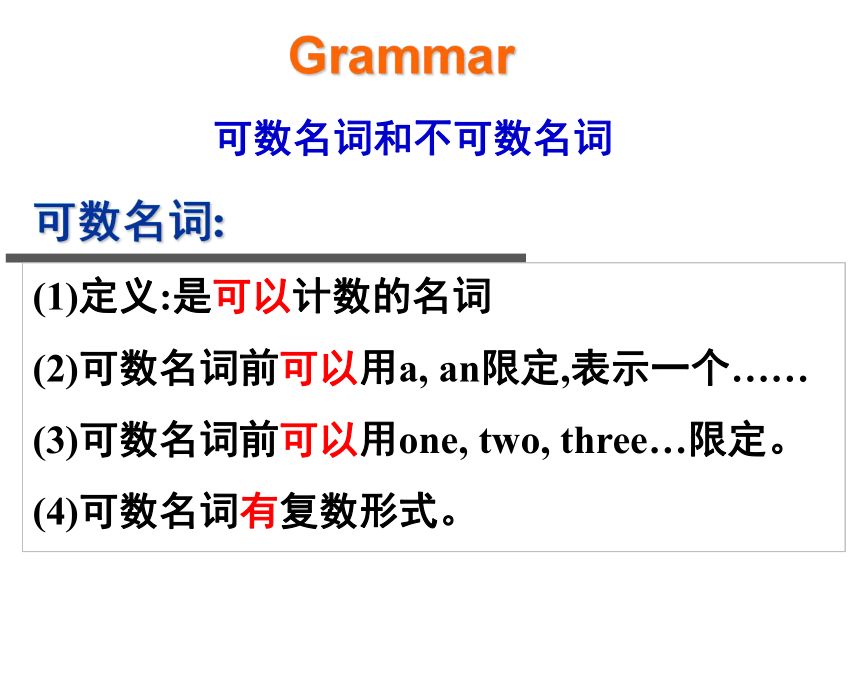
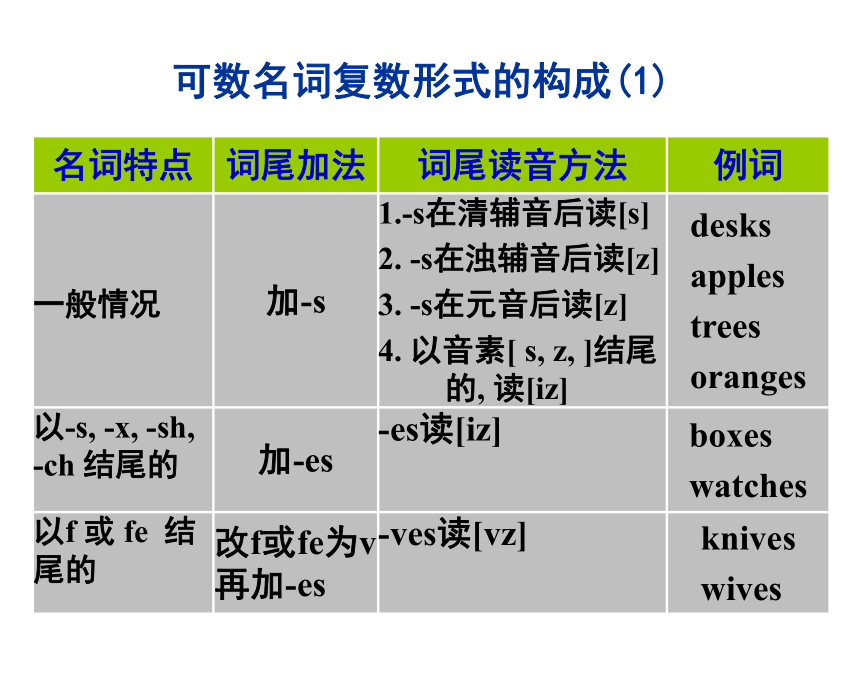
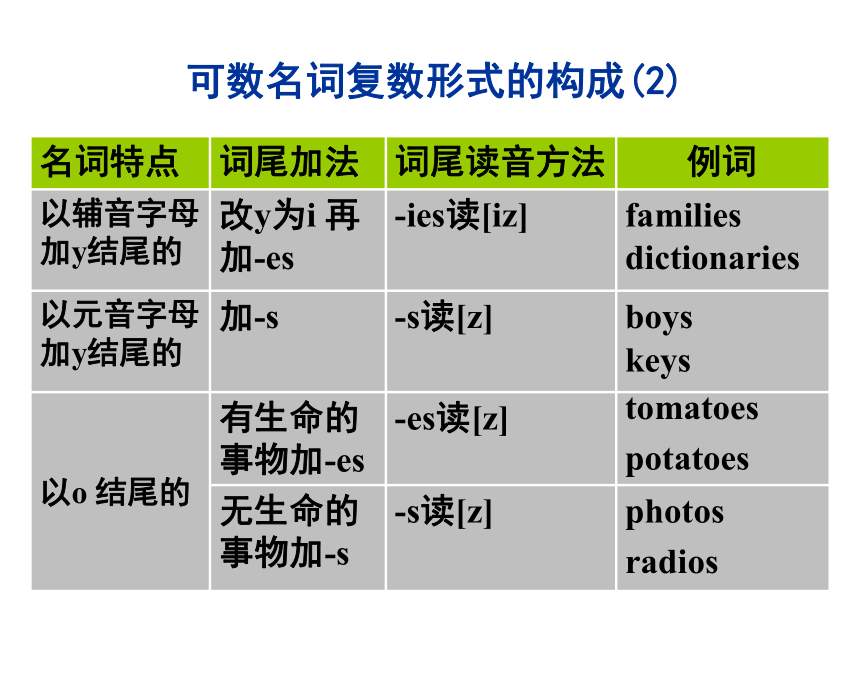
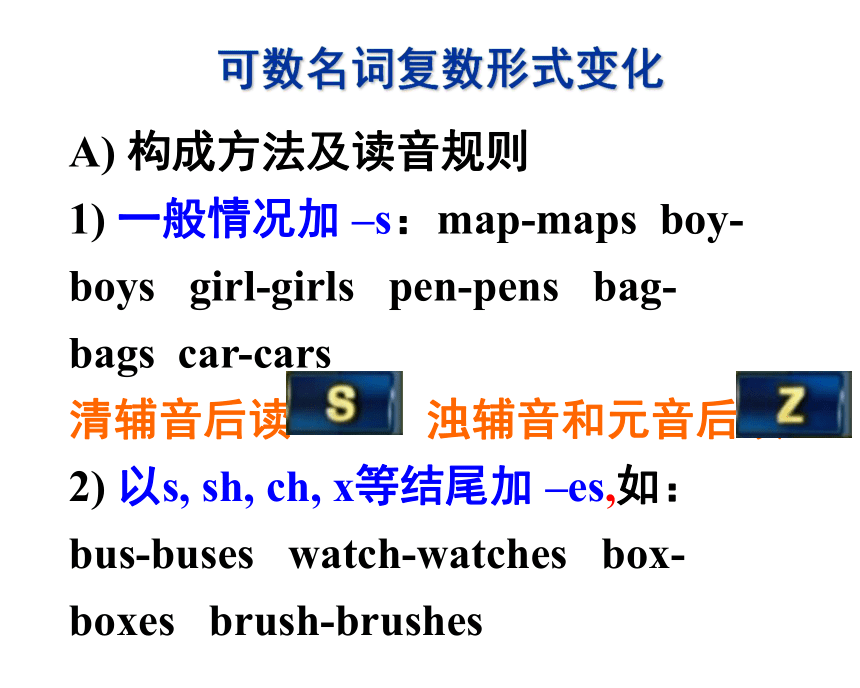
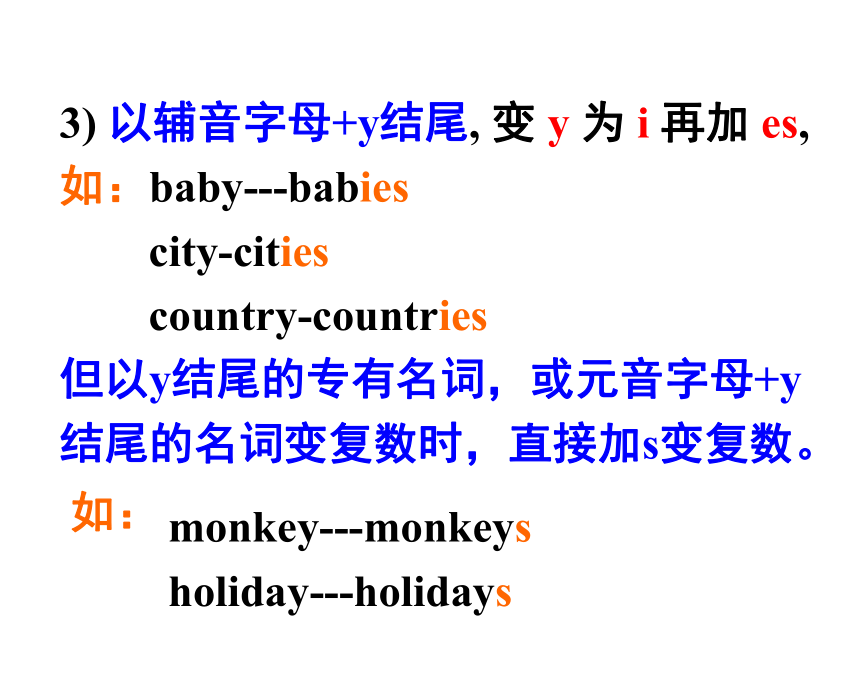
文档简介
(共27张PPT)
7A Unit 6
Food and lifestyles
Grammar
apple orange cup plate
egg dish pork salt
beef bread cake hamburger
cabbage Coke bowl juice shelf
meat milk rice tomato sugar
Can you help them find the right family?
Countable and uncountable nouns
countable uncountable
… …
Singular(单数) plural(复数)
Most nouns +s cake→ cakes
Nouns ending in a consonant +y -y +ies story →stories
Nouns ending in s, sh, ch, or x +es bus →buses
wish →wishes
watch→watches
box →boxes
singular(单数) plural(复数)
Nouns ending in o +s or +es photo → photos
potato → potatoes
tomato → tomatoes
Nouns ending in f or fe -f or fe +ves half → halves
knife →knives
Some other nouns man →men
woman →women
foot →feet
tooth → teeth
child → children
sheep →sheep
可数名词:
(1)定义:是可以计数的名词
(2)可数名词前可以用a, an限定,表示一个……
(3)可数名词前可以用one, two, three…限定。
(4)可数名词有复数形式。
可数名词和不可数名词
Grammar
可数名词复数形式的构成(1)
名词特点 词尾加法 词尾读音方法 例词
一般情况 加-s 1.-s在清辅音后读[s]
2. -s在浊辅音后读[z]
3. -s在元音后读[z]
4. 以音素[ s, z, ]结尾的, 读[iz] desks
apples
trees
oranges
以-s, -x, -sh,
-ch 结尾的 加-es -es读[iz]
boxes
watches
以f 或 fe 结尾的 改f或fe为v再加-es -ves读[vz] knives
wives
可数名词复数形式的构成(2)
名词特点 词尾加法 词尾读音方法 例词
以辅音字母加y结尾的 改y为i 再加-es -ies读[iz]
families
dictionaries
以元音字母加y结尾的 加-s
-s读[z] boys
keys
以o 结尾的
有生命的事物加-es -es读[z] tomatoes
potatoes
无生命的事物加-s -s读[z] photos
radios
A) 构成方法及读音规则
1) 一般情况加 –s:map-maps??boy-boys? ?girl-girls? ?pen-pens? ?bag-bags??car-cars
清辅音后读 浊辅音和元音后读
2) 以s, sh, ch, x等结尾加 –es,如:
bus-buses? ?watch-watches? ?box-boxes? ?brush-brushes ?
可数名词复数形式变化
3) 以辅音字母+y结尾, 变 y 为 i 再加 es, 如:baby---babies? ?
city-cities? ?
country-countries
但以y结尾的专有名词,或元音字母+y 结尾的名词变复数时,直接加s变复数。
如: ?
monkey---monkeys ? ?
holiday---holidays
4) 以o结尾的名词,变复数时:
A. 加s, 如: photo— photos
piano—pianos
radio—radios
zoo—zoos;
B. 加es, 如: potato— potatoes
tomato—tomatoes
5) 以 f 或 fe 结尾的名词变复数时:
改 f, fe v加 -es,
如:half—halves knife—knives
leaf--leaves ? ?? wolf—wolves
wife—wives life—lives ? ?? ???
Notes: 由一个词加 man 或 woman构成的合成词, 其复数形式也是 -men 和-women, 如an Englishman, two Englishmen。但German不是合成词, 故复数形式为Germans;Bowman是姓,其复数是the Bowmans。
B)名词复数的不规则变化
child—children, foot—feet,
tooth—teeth, mouse—mice,? ?
man—-men, woman—women
2) 单复同形, 如deer, sheep, fish, Chinese, Japanese, 等。但除人民币的元、角、分外, 美元、英镑、法郎等都有复数形式。如:a dollar, two dollars; a meter, two meters。
3) 集体名词, 以单数形式出现, 但实为复数。例如:people, police 等本身就是复数,不能说 a people, a police, 但可以说a person, a policeman.
4)以s结尾,仍为单数的名词,如:
a. maths, politics, physics等学科名词,一般是不可数名词,为单数。
b. news 为不可数名词。
c. the United States, the United Nations 应视为单数。
The United Nations was organized in 1945. 联合国是1945年组建起来的。
d. 以复数形式出现的书名,剧名,报纸,杂志名,也可视为单数。
不可数名词
(1)定义:是指不能计数的名词。
(2)不可数名词前不可以用a , an限定。
(3)不可数名词前不可以用one, two, three…
限定。
(4)不可数名词没有复数形式。
不可数名词主要分为
物质名词和抽象名词。
1) 物质名词是指表示无法分为个体的实物的词, 常见的物质名词, 如:snow(雪), rain(雨), water(水), coffee(咖啡), tea(茶), meat (肉), milk(牛奶), rice(米饭), bread(面包), orange (桔汁), beef (牛肉), chicken(鸡肉), juice (果汁), pork(猪肉), Coke (可口可乐), ice cream (冰激凌) 等;
写出下列名词的复数形式
1. apple – apples 2. orange – oranges
3. potato – potatoes 4. carrot – carrots
5. banana – bananas 6. egg – eggs
7. hamburger – hamburgers
8. noodle – noodles 9. onion – onions
10. vegetable – vegetables
11. tomato – tomatoes 12. melon – melons
十一个婴儿
九个男孩
四个班级
我的五张相片
eleven babies
nine boys
four classes
my five photos
Translation
六只收音机
三个好朋友
十八只猴子
七把小刀
six radios
three good friends
eighteen monkeys
seven knives
a piece
of bread
a glass
of water
a plate
of chicken
a packet
of salt
two
bags
of rice
three
cups
of tea
four
kilos
of meat
five
cartons
of meat
six
bottles
of juice
a packet of salt
packets of sugar
two cups of tea
four bottles of water
two cartons of milk
one carton of milk
a bottle of water
量词
Hobo wants to buy some things for
Christmas. Help him complete the list.
bottle, can, kilo, bowl, carton, cup
____________ tea
_____________ milk
three cups of
two bottles of
kilos of
three________ chicken
________ soup
______________ milk
a bowl of
a can of
three cartons of
________ Coca-Cola
1. Let’s go shopping for food and _______ (饮料).
2. We haven’t got any _______ (肉).
3. Let’s get some _______ (鸡肉).
4. Have you got _____ (一些) chocolate?
drink
meat
chicken
any
Practice
A. 填空:
6. Let’s get some ______ (咖啡) for mum.
5. What _______ (种类) of fruit do you
like best?
7. How about some apple _______ (果汁)?
8. There are lots of _________ (西红柿)
in the basket.
tomatoes
juice
coffee
kind
B. 按要求改写句子:
There is some fish on the plate.(改为否定句)
2. We have got some oranges.
Have you got any oranges?
(改为一般疑问句)
There isn’t any fish on the plate.
3. They have got some milk and water.
(改为否定句)
4. There is a tomato on the table.
(改为复数形式)
5. He has got a potato.(改为复数形式)
They haven’t got any milk and water.
There are some tomatoes on the table.
They have got some potatoes.
C. 完成句子:
1. 吃太多巧克力对你不好。
Eating too much chocolate
_____________________ you.
2.我通常星期天购物。
I usually ___________ on Sundays.
isn’t good for/ is bad for
go shopping
7A Unit 6
Food and lifestyles
Grammar
apple orange cup plate
egg dish pork salt
beef bread cake hamburger
cabbage Coke bowl juice shelf
meat milk rice tomato sugar
Can you help them find the right family?
Countable and uncountable nouns
countable uncountable
… …
Singular(单数) plural(复数)
Most nouns +s cake→ cakes
Nouns ending in a consonant +y -y +ies story →stories
Nouns ending in s, sh, ch, or x +es bus →buses
wish →wishes
watch→watches
box →boxes
singular(单数) plural(复数)
Nouns ending in o +s or +es photo → photos
potato → potatoes
tomato → tomatoes
Nouns ending in f or fe -f or fe +ves half → halves
knife →knives
Some other nouns man →men
woman →women
foot →feet
tooth → teeth
child → children
sheep →sheep
可数名词:
(1)定义:是可以计数的名词
(2)可数名词前可以用a, an限定,表示一个……
(3)可数名词前可以用one, two, three…限定。
(4)可数名词有复数形式。
可数名词和不可数名词
Grammar
可数名词复数形式的构成(1)
名词特点 词尾加法 词尾读音方法 例词
一般情况 加-s 1.-s在清辅音后读[s]
2. -s在浊辅音后读[z]
3. -s在元音后读[z]
4. 以音素[ s, z, ]结尾的, 读[iz] desks
apples
trees
oranges
以-s, -x, -sh,
-ch 结尾的 加-es -es读[iz]
boxes
watches
以f 或 fe 结尾的 改f或fe为v再加-es -ves读[vz] knives
wives
可数名词复数形式的构成(2)
名词特点 词尾加法 词尾读音方法 例词
以辅音字母加y结尾的 改y为i 再加-es -ies读[iz]
families
dictionaries
以元音字母加y结尾的 加-s
-s读[z] boys
keys
以o 结尾的
有生命的事物加-es -es读[z] tomatoes
potatoes
无生命的事物加-s -s读[z] photos
radios
A) 构成方法及读音规则
1) 一般情况加 –s:map-maps??boy-boys? ?girl-girls? ?pen-pens? ?bag-bags??car-cars
清辅音后读 浊辅音和元音后读
2) 以s, sh, ch, x等结尾加 –es,如:
bus-buses? ?watch-watches? ?box-boxes? ?brush-brushes ?
可数名词复数形式变化
3) 以辅音字母+y结尾, 变 y 为 i 再加 es, 如:baby---babies? ?
city-cities? ?
country-countries
但以y结尾的专有名词,或元音字母+y 结尾的名词变复数时,直接加s变复数。
如: ?
monkey---monkeys ? ?
holiday---holidays
4) 以o结尾的名词,变复数时:
A. 加s, 如: photo— photos
piano—pianos
radio—radios
zoo—zoos;
B. 加es, 如: potato— potatoes
tomato—tomatoes
5) 以 f 或 fe 结尾的名词变复数时:
改 f, fe v加 -es,
如:half—halves knife—knives
leaf--leaves ? ?? wolf—wolves
wife—wives life—lives ? ?? ???
Notes: 由一个词加 man 或 woman构成的合成词, 其复数形式也是 -men 和-women, 如an Englishman, two Englishmen。但German不是合成词, 故复数形式为Germans;Bowman是姓,其复数是the Bowmans。
B)名词复数的不规则变化
child—children, foot—feet,
tooth—teeth, mouse—mice,? ?
man—-men, woman—women
2) 单复同形, 如deer, sheep, fish, Chinese, Japanese, 等。但除人民币的元、角、分外, 美元、英镑、法郎等都有复数形式。如:a dollar, two dollars; a meter, two meters。
3) 集体名词, 以单数形式出现, 但实为复数。例如:people, police 等本身就是复数,不能说 a people, a police, 但可以说a person, a policeman.
4)以s结尾,仍为单数的名词,如:
a. maths, politics, physics等学科名词,一般是不可数名词,为单数。
b. news 为不可数名词。
c. the United States, the United Nations 应视为单数。
The United Nations was organized in 1945. 联合国是1945年组建起来的。
d. 以复数形式出现的书名,剧名,报纸,杂志名,也可视为单数。
不可数名词
(1)定义:是指不能计数的名词。
(2)不可数名词前不可以用a , an限定。
(3)不可数名词前不可以用one, two, three…
限定。
(4)不可数名词没有复数形式。
不可数名词主要分为
物质名词和抽象名词。
1) 物质名词是指表示无法分为个体的实物的词, 常见的物质名词, 如:snow(雪), rain(雨), water(水), coffee(咖啡), tea(茶), meat (肉), milk(牛奶), rice(米饭), bread(面包), orange (桔汁), beef (牛肉), chicken(鸡肉), juice (果汁), pork(猪肉), Coke (可口可乐), ice cream (冰激凌) 等;
写出下列名词的复数形式
1. apple – apples 2. orange – oranges
3. potato – potatoes 4. carrot – carrots
5. banana – bananas 6. egg – eggs
7. hamburger – hamburgers
8. noodle – noodles 9. onion – onions
10. vegetable – vegetables
11. tomato – tomatoes 12. melon – melons
十一个婴儿
九个男孩
四个班级
我的五张相片
eleven babies
nine boys
four classes
my five photos
Translation
六只收音机
三个好朋友
十八只猴子
七把小刀
six radios
three good friends
eighteen monkeys
seven knives
a piece
of bread
a glass
of water
a plate
of chicken
a packet
of salt
two
bags
of rice
three
cups
of tea
four
kilos
of meat
five
cartons
of meat
six
bottles
of juice
a packet of salt
packets of sugar
two cups of tea
four bottles of water
two cartons of milk
one carton of milk
a bottle of water
量词
Hobo wants to buy some things for
Christmas. Help him complete the list.
bottle, can, kilo, bowl, carton, cup
____________ tea
_____________ milk
three cups of
two bottles of
kilos of
three________ chicken
________ soup
______________ milk
a bowl of
a can of
three cartons of
________ Coca-Cola
1. Let’s go shopping for food and _______ (饮料).
2. We haven’t got any _______ (肉).
3. Let’s get some _______ (鸡肉).
4. Have you got _____ (一些) chocolate?
drink
meat
chicken
any
Practice
A. 填空:
6. Let’s get some ______ (咖啡) for mum.
5. What _______ (种类) of fruit do you
like best?
7. How about some apple _______ (果汁)?
8. There are lots of _________ (西红柿)
in the basket.
tomatoes
juice
coffee
kind
B. 按要求改写句子:
There is some fish on the plate.(改为否定句)
2. We have got some oranges.
Have you got any oranges?
(改为一般疑问句)
There isn’t any fish on the plate.
3. They have got some milk and water.
(改为否定句)
4. There is a tomato on the table.
(改为复数形式)
5. He has got a potato.(改为复数形式)
They haven’t got any milk and water.
There are some tomatoes on the table.
They have got some potatoes.
C. 完成句子:
1. 吃太多巧克力对你不好。
Eating too much chocolate
_____________________ you.
2.我通常星期天购物。
I usually ___________ on Sundays.
isn’t good for/ is bad for
go shopping
同课章节目录
- 预备课程
- Lesson 1 Nice to meet you !
- Lesson 2 A happy family
- Lesson 3 A nice school
- Lesson 4 You look cool !
- Lesson 5 Wonderful things
- Lesson 6 Have nice food
- Lesson 7 Enjoy our days
- Lesson 8 Let's have fun !
- Unit 1 This is me
- Unit 2 Let's play sports
- Unit 3 Welcome to our school
- Unit 4 My day
- Unit 5 Let’s celebrate
- Unit 6 Food and lifestyle
- Unit 7 Shopping
- Unit 8 Fashion
